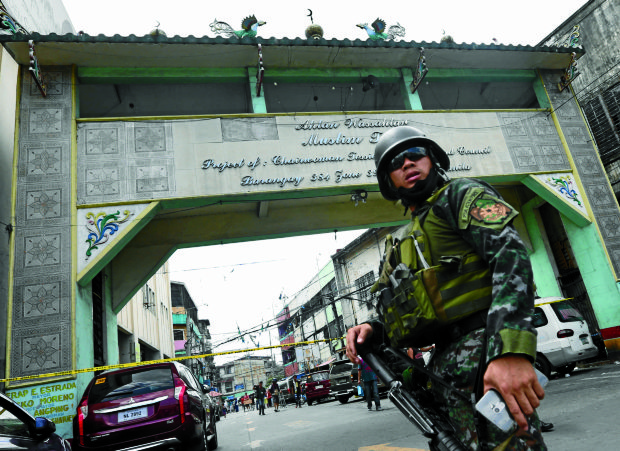Blast probers focus on Muslim cleric

CLOSE WATCH A police Special Action Force officer keeps a close watch on the Muslim community in Quiapo, Manila, on Sunday, after a blast that killed two men on Saturday. —MARIANNE BERMUDEZ
A Shiite Muslim cleric was the likely target of explosions that killed two people in Manila on Saturday, police officials said on Sunday, rejecting Islamic State (IS) group claims of involvement.
Six others were wounded when two explosions rocked the office of the imam, Nasser Abinal, in Manila’s Quiapo district, on Saturday.
Director Oscar Albayalde, head of the National Capital Region Police Office, said the bomb was apparently intended for Abinal, who is also a lawyer for the Bureau of Internal Revenue in Manila.
Abinal was not at the office at the time.
Threats to his life
“He (Abinal) admitted there were threats to his life in the past” while being questioned by police, Albayalde said.
He said the bombing was apparently set off by a personal feud, adding the package that contained the explosive was intended for Abinal.
The bomb was carried in a package by a hired delivery man who handed it over to an aide of Abinal just before it went off.
Chief Supt. Joel Coronel, Manila Police District director, identified the delivery man as Mark Anthony Torres and Abinal’s aide as Muhammad Baniga.
The blast killed both men.
As police were searching the blast site late on Saturday, another explosion rocked the area, possibly from a second bomb planted earlier, Albayalde said.
“This has nothing to do with terrorism. There is no indication that this was done by a terror group, local or foreign,” he said.
IS has claimed it staged the explosion.
“Five Shiites were killed and six others wounded in a bomb blast by Islamic State fighters in the center of Manila,” said a statement from Amaq, the IS propaganda arm.
Albayalde said this was just the IS custom of taking credit for any such incidents.
But Albayalde said the attack seemed to be targeting Abinal, adding that it may be for personal reasons.
Coronel also believed Abinal was the target of the attack, which he said could be related to Abinal’s work as a government lawyer or as a religious leader.
Besides threats that he had received through calls, e-mails and text messages, Abinal had also received a notice evicting him from his office on Gunao Street, Coronel said.
The blasts came a week after a pipe bomb exploded in the same area, injuring 14 people, at the height of the Association of Southeast Asian Nations (Asean) summit in Manila.
Police blamed the explosion on rival gangs operating in the area.
Albayalde said on Sunday that Saturday’s blasts were not related to the April 28 explosion.
That explosion has already been solved, with one of five suspects now in police custody, he said.
Coronel said the suspect in custody would be presented to the press at the Manila Police headquarters on Monday.
The suspect is the brother-in-law of a 14-year-old boy who was beaten up by local toughies in Quiapo, leading to the bomb attack, Coronel said.
Tensions remained high after the blasts, with police cordoning off the area again on Sunday after a suspicious bag was spotted.
False alarm
A bomb disposal robot later established it was a false alarm.
Malacañang urged the public to stay alert but avoid spreading “unverified” news that may cause panic.
“While [an] investigation is [going on], we ask the public to remain alert and immediately report to authorities any suspicious activity or movement,” presidential spokesperson Ernesto Abella said in a statement on Sunday.
“Also we urge our people to refrain from forwarding the news from unverified sources that may cause undue alarm and panic,” Abella added.
The British Embassy in Manila advised its citizens to stay away from Quiapo.
In a travel advisory issued on Sunday, the UK Foreign and Commonwealth Office told British citizens in Manila to keep themselves up to date with information from the media and follow the advice of local authorities and the police.
“Terrorists are very likely to try to carry out attacks in the Philippine. Terrorist groups continue to plan attacks and have the capacity and the intent to carry out attacks at anytime and anywhere in the country,” the advisory said.
It said attacks could happen in places visited by foreigners like airports, shopping malls, public transport and places of worship. —WITH REPORTS FROM NIKKO DIZON, JOCELYN R. UY, AFP AND AP